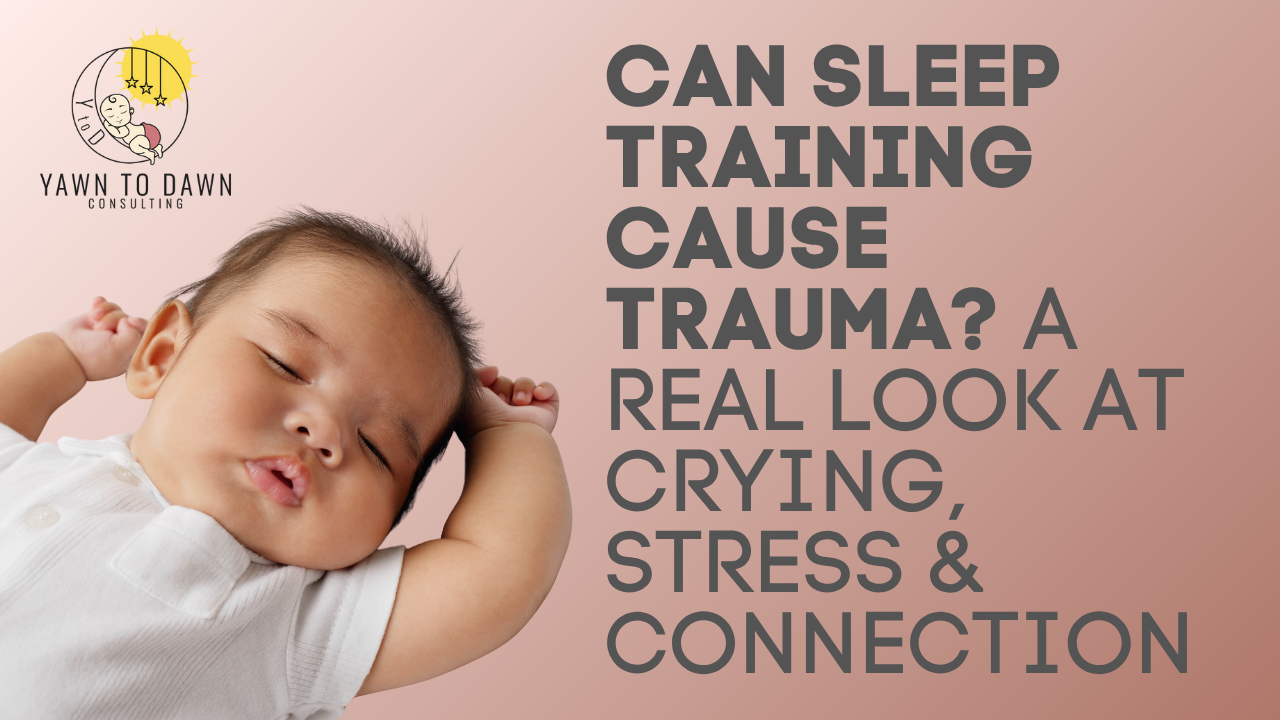Can Sleep Training Cause Trauma? A Real Look at Crying, Stress & Connection
Jul 12, 2025
If you’ve ever read an internet post that said:
“Sleep training is traumatic.”
“Your baby cries because they feel abandoned.”
“You’re causing toxic stress!”
—then you’re not alone. As a certified sleep consultant Singapore parents turn to, I know how overwhelming this fear can feel. But let’s pause.
Let’s look at what trauma really is… and whether sleep training even comes close to it.
What Is Childhood Trauma?
Trauma is not just a hard moment. It’s something that overwhelms a child’s nervous system, makes them feel unsafe or disconnected from their caregiver, and has lasting negative effects.
True trauma disrupts emotional development, attachment, and stress regulation.
But not all crying is trauma.
Discomfort ≠ damage.
Crying during a vaccine, brushing teeth, or yes even sleep training is not inherently harmful.
Is Crying During Sleep Training Dangerous?
Babies cry. They cry when they’re hungry, overstimulated, tired, or learning something new.
During sleep training , babies may cry because we’re gently helping them learn to fall asleep without sleep crutches like feeding or rocking. That’s not trauma it’s temporary frustration in a safe, supportive environment.
And when done right, sleep training:
- Has structure
- Involves check-ins or soothing
- Maintains emotional connection
- Happens in a loving, regulated household
What About Cortisol and Toxic Stress?
Yes, crying increases cortisol but only for short periods.
What’s harmful is prolonged, unbuffered stress without caregiver support.
A landmark study (Gradisar et al., 2016) found that:
- Babies who were sleep trained had lower baseline cortisol after just a few nights
- They experienced better sleep and were more settled during the day
Other studies (like Hiscock et al., 2008 and 2012) showed that sleep training:
- Had no negative effect on emotional development or parent-child attachment
- Improved maternal mental health and even relationship satisfaction
These are all benefits I see every day in my infant sleep training program.
But Isn’t It Neglect to Not Respond Immediately?
Let’s clarify:
Sleep training does NOT mean leaving your baby to cry alone indefinitely.
It’s not about ignoring distress. It’s about giving your baby a safe space to learn independent sleep—without co-sleeping or nursing to sleep.
In my programs (trusted for baby sleep training Singapore, India, and globally), I help parents:
- Establish emotionally secure routines
- Keep one night feed if needed
- Check in gently when baby protests
- Maintain closeness, bonding, and structure
This is not trauma. It’s responsive parenting with a plan.
So Can Sleep Training Cause Trauma?
No—not when done in a healthy, connected, regulated home.
Trauma happens in environments of emotional abandonment, chronic neglect, or unrepaired disconnection.
Sleep training with love, intention, and follow-through doesn’t come close to that.
In fact, sleep training often:
- Improves parent-child bonding
- Helps moms feel more present and emotionally available
- Supports breastfeeding (yes, even exclusively breastfed babies can be sleep trained!)
- Builds confidence and joy in the home
My Story
I sleep trained my daughter at 6 months. Before that, I was exhausted—sleep-deprived, anxious, and overwhelmed. I wasn’t the mother I knew I could be.
After sleep training, I became calmer, more connected, and more present.
We’re incredibly bonded today. I am her safe space for all big feelings and she still sleeps independently through the night.
That’s not trauma. That’s transformation.
Ready to Sleep Train Without Guilt?
If you’ve been googling “Can sleep training cause trauma?” or “Is crying during sleep training harmful?”—this is your sign to pause the fear.
With the right plan, and support from a trusted sleep trainer, you can teach your baby to sleep without ever breaking your bond.
Explore my 1:1 Sleep Training Program
References
Gradisar, M., Jackson, K., Spurrier, N. J., Gibson, J., Williams, A. S., & Kennaway, D. J. (2016). Behavioral Interventions for Infant Sleep Problems: A Randomized Controlled Trial. Pediatrics, 137(6), e20151486. https://doi.org/10.1542/peds.2015-1486
Hiscock, H., Bayer, J. K., Price, A., Ukoumunne, O. C., & Wake, M. (2008). Improving infant sleep and maternal mental health: A cluster randomized trial. Archives of Disease in Childhood, 93(10), 951–955. https://doi.org/10.1136/adc.2007.126292
Hiscock, H., et al. (2012). Five-year follow-up of behavioral infant sleep intervention: Randomized trial. Pediatrics, 130(4), 643–651. https://doi.org/10.1542/peds.2011-3467


